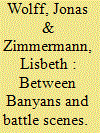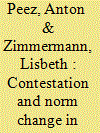|
|
|
Sort Order |
|
|
|
Items / Page
|
|
|
|
|
|
|
| Srl | Item |
| 1 |
ID:
145513


|
|
|
|
|
| Summary/Abstract |
In studying the global spread and implementation of liberal norms, scholars have moved from linear notions of norm diffusion and promotion to an emphasis on norm contestation. Contestation by the supposed beneficiaries and addressees has taken centre stage in both research on the norms that underpin global governance and in studies on democracy promotion and liberal peacebuilding. While the impetus of this scholarship is normative – to overcome the taken-for-granted nature of liberal norms – the concept of contestation itself is mainly used with an analytical interest. Yet, as we show in this article, contestation also comes with – oftentimes implicit – normative connotations. Focusing on the seminal work of Milja Kurki, Oliver Richmond, Antje Wiener, and Amitav Acharya, we reconstruct these normative connotations. It turns out that the normative take on contestation is fairly conventional in all four approaches. Contestation is largely seen as a means to enable dialogue, as illustrated by Acharya’s metaphor of the Banyan tree. Fundamental conflicts over liberal norms (‘battle scenes’) are either not considered or seen as normatively undesirable. As a way forward, we propose a typology that enables scholars to empirically analyse contestation in its different expressions and suggest two strategies to normatively assess practices of contestation.
|
|
|
|
|
|
|
|
|
|
|
|
|
|
|
|
| 2 |
ID:
185245


|
|
|
|
|
| Summary/Abstract |
Elephants and whales took center stage in the environmental movements of the 1980s. As flagship species, they were the poster children of global initiatives: international ivory trading and commercial whaling were banned in the 1980s in the context of the Convention on International Trade in Endangered Species of Wild Fauna and Flora (CITES) and the International Whaling Commission (IWC), respectively. While the conservation of both species is contested, we observe a change of existing norms in one case but not in the other: A moratorium on commercial whaling remains in place. Meanwhile, a limited shift to sustainable use regarding ivory was passed in 1997/2000. We ask why norm change occurred in one case but not the other, given their similarities. We argue that the difference can be explained by the perceived legitimacy of the claims of norm challengers using arguments of “affectedness” and the breadth of issues covered by CITES. In contrast, other factors commonly discussed in norms research do not explain this puzzle: the relative power and strategies of norm advocates and challengers, and the degree of legalization. This shows the interplay of discursive aspects and concrete institutional opportunities for norm change, even in the face of otherwise inopportune conditions.
|
|
|
|
|
|
|
|
|
|
|
|
|
|
|
|
| 3 |
ID:
157543


|
|
|
|
|
| Summary/Abstract |
How are global norms translated into local contexts? I examine the translation of three rule-of-law norms in postconflict Guatemala: the UN Convention on the Rights of the Child, the right to access public information, and best practices for international rule-of-law commissions. These cases, I argue, do not fit established models for diffusion, such as those associated with standard bargaining approaches, norm socialization frameworks, and norm localization theory. Instead, rule-of-law promotion triggered domestic contestation and, subsequently, what I term an “interactive translation loop.” These processes changed the modes of interaction among rule-of-law promoters and how the norms ultimately translated into the Guatemalan context. I demonstrate that a critical variable, the precision of international norms, conditions the leeway available for such translations. To the extent that my framework travels to other cases, it offers an important corrective to established theories of how global norms translate into local contexts.
|
|
|
|
|
|
|
|
|
|
|
|
|
|
|
|
| 4 |
ID:
164457


|
|
|
|
|
| Summary/Abstract |
The introduction develops this special issue's main research question: under which conditions are challenges to norms likely to decrease their robustness? The issue presents current research on contestation and norm robustness and discusses its limitations. We conceptualize a norm's robustness by examining both the practical and discursive dimensions. Robustness is high when norm addressees express widespread discursive acceptance of a norm's claims (validity) that also generally guide addressees’ actions (facticity). When normative claims are discursively rejected by most addressees and do not guide their actions, robustness is low. The contributions develop four broad indicators for measuring robustness (concordance, third-party reactions to norm violation, compliance, and implementation). The norms analyzed here were not easily eroded; despite direct challenges, they remained surprisingly robust. This indicates that norm robustness is not determined by the relative power of norm challengers, but rather types of contestation and structural factors. These include being embedded in larger normative structures, institutionalization, and legal character, although effects of these factors are more ambivalent than norm research has usually supposed.
|
|
|
|
|
|
|
|
|
|
|
|
|
|
|
|
| 5 |
ID:
145110


|
|
|
|
|
| Summary/Abstract |
Reactions to the promotion of human rights norms in post-conflict countries often clash with central assumptions of established theoretical approaches to norm diffusion. Socialization scholars expect either resistance when strong veto players are present and when resonance is missing, or extensive adoption of norms when states are vulnerable to transnational advocacy. Others predict decoupling processes when local capacities for implementation are scarce. Research on norm localization, in contrast, foresees the reinterpretation and modification of norms. The concept of localization, however, is often used as a catch-all category. Based on a new three-step model of translation into discourse, law, and implementation, I distinguish different types of translation. This conceptual approach to norm translation gives an interactional account of how certain types of translation emerge and shows the limits of “cures” for missing compliance proposed in existing approaches. The discussion draws on examples of human rights promotion in post-conflict Guatemala.
|
|
|
|
|
|
|
|
|
|
|
|
|
|
|
|
| 6 |
ID:
171767


|
|
|
|
|
| Summary/Abstract |
Contestation of international norms has become the new focus of IR norm research. The optimism of the 1990s that fundamental liberal norms would diffuse globally has remained unfulfilled in recent years—even human rights norms have witnessed strong contestation. Time and again, controversy has erupted regarding international norms such as the ban on torture or the Responsibility to Protect. Meanwhile, we know little about how such controversy affects the robustness of norms—whether it contributes to their weakening or to their strengthening. Existing research offers two competing hypotheses: One branch of norm research often conceptualizes contestation as a sign of norm weakening. By contrast, another branch assigns contestation a normative power of its own, which strengthens norms. It does not specify the limits of such normative power, however. In this article, we argue that contestation per se is a poor predictor of norm robustness. The type of contestation a norm faces matters. Contestation can either (1) address the dimension of application of a norm or (2) examine its validity by questioning the righteousness of the claims a norm makes. The article draws on two illustrative case studies of extensively contested norms, the Responsibility to Protect and the ban on commercial whaling. We argue that widespread contestation of the very validity of a norm is likely to lead to a loss of norm robustness. Applicatory contestation, by contrast, can—under specific circumstances—even strengthen it.
|
|
|
|
|
|
|
|
|
|
|
|
|
|
|
|
|
|
|
|
|